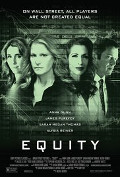
Directed by
Meera Menon
100 minutes
Rated M
Reviewed by
Chris Thompson

Equity
Synopsis: Denied a promotion, investment banker Naomi Bishop (Anna Gunn) aims to consolidate her position by snagging the lead on the Initial Public Offering for a hot new privacy and social media platform created by wunderkind Ed (Samuel Roukin). But soon the pressure starts to build. Firstly, her sexual relationship with company superior, Michael Connor (James Purefoy) draws the attention of Samantha (Alysia Reiner), an estranged friend who is investigating corrupt dealings between Connor and high stakes investor, Benji Akers (Craig Bierko). Then, the IPO deal begins to sour. And all the while, tensions are rising between Bishop and Erin (Sarah Megan Thomas), her ambitious junior partner.
“I like money... I am not going to sit here and tell you I only do what I do to take care of other people, because it is okay to do it for ourselves, for how it makes us feel. Secure? Yeah. Powerful? Absolutely. I am so glad that it’s finally acceptable for women to talk about ambition openly. But don’t let money be a dirty word. We can like that, too.” When Gunn’s character Naomi Bishop makes this speech to a group of students early in the film, we can’t help but be immediately (and deliberately) reminded of Gordon Gekko in Oliver Stone’s 1987 film, Wall Street.
But there’s a big difference here. The boys club that is reflected on screen (and behind the camera too) in Wall Street and other films of that ilk is subverted to a large extent in this movie by focusing the story around three strong female characters created by a largely female crew led by director Menon working with a screenplay by Amy Fox developed from a story by Fox and cast members Thomas and Reiner. On this level, at least, the film succeeds with great performances from Gunn and Thomas and, to a slightly lesser extent, Reiner. It most certainly passes the Bechdel Test (and if you don’t know what that is, Google it!)
Where the film falters, though, is in its aspiration to be a thriller. Yes, it certainly sits closer to a gripping film like Margin Call (2011) than to a more humorous take on financial misdeeds and immorality like last year’s The Big Short but it struggles to maintain the tension with uneven pacing and a few too many side stories to keep us either on track or on the edge of our seat. And metaphors like the teetering Jenga game played between Bishop and her boss are just a bit too obvious and literal.
What’s most compelling, though, are the scenes between Bishop and Erin, her junior partner, where Bishop seems to visit the same strictures of the glass ceiling upon her underling that have been visited upon her from the boys at the top. It’s the strongest arc in the film’s otherwise pretty predictable narrative and it’s the most engaging element.
Still, it would be remiss to only consider this film as an exercise in gender equality or on its merits as to whether it does or doesn’t succeed as a thriller. There’s something more going on behind those two more obvious aspects of Equity. There’s barely a likeable character in this story and, ordinarily, that would be a big negative for a movie. But here, it’s actually intrinsic to what the filmmakers are telling us: that the world of finance is as rife with venal, self-serving narcissists today as it was when Gordon Gekko told us that ‘greed is good’. Even in the case of Naomi Bishop whom we probably like more than most, we can see that in order to survive this world – not just the male dominated world, but the cut-throat world on investment and finance in general – she must be willing to sacrifice her soul.

Want more about this film?


Want something different?




